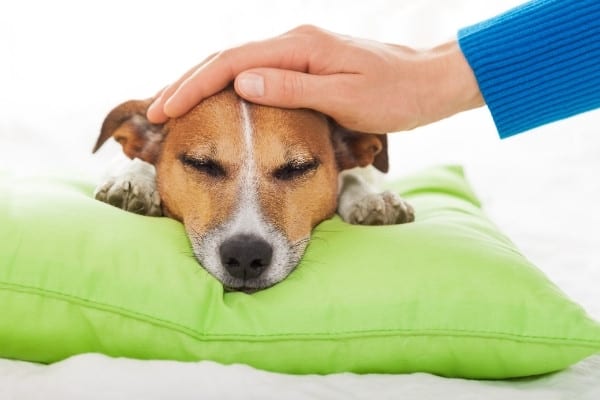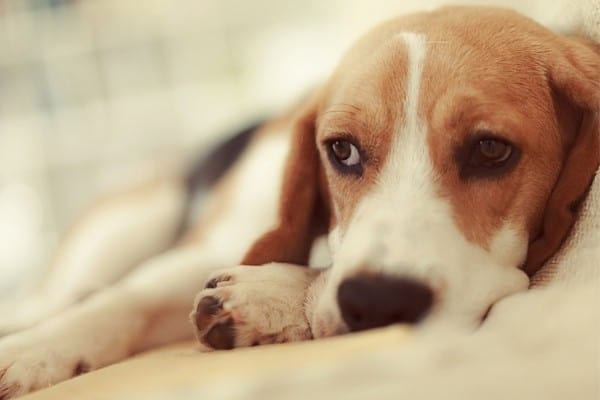
Parvo is a nasty virus that can affect puppies and adult dogs. If your puppy has parvo, of course you are worried that he won’t pull through.
It’s important to take your puppy to a vet as soon as you notice symptoms of the virus. When your vet sends your dog home, follow all the care instructions given to you.
Also, use the information below to help keep your puppy comfortable while he recovers.
How do I know if my puppy will survive parvo? If the puppy makes it past the 72 hour mark, has been treated and released by a vet, and shows signs of improvement, there is a good chance he will survive. Positive signs include no more vomiting or fever, improved appetite, normal stools, increased energy, and a gradual return to normal behavior.
If your puppy is recovering from parvo, you are likely working hard to make him comfortable and help him recover, but it can still be a scary time for both you and your puppy.
Below, you’ll find more information on what to look for, how to provide supportive care during recovery, and more.
Positive Signs That Indicate Your Puppy Will Survive Parvo
Your puppy may have some or all of the most common parvo symptoms and may recover faster or slower than expected.
Once you start seeing some of these positive signs, you will know your puppy is starting to pull through and has a better chance of survival.
Vomiting Stops
Frequent vomiting is one of the most common symptoms and signs of parvo in dogs. Once your puppy stops vomiting, they are less at risk for dehydration and may be starting to recover.
Appetite Improves
When the vomiting stops, your dog may regain his appetite. This is a great sign and means that your dog’s stomach is now strong enough to hold food and your dog feels well enough to eat.
Keep in mind, your pet may have a weak stomach for a few days while recovering and should not overeat.
It’s best to start with a bland diet of plain rice or boiled eggs before allowing your dog to eat a normal diet.
Fever Disappears
Your dog may run a fever while sick with parvo. When the fever breaks or goes away, it means the body is winning the battle against the virus and they are starting to recover.
Stool Returns to Normal
Diarrhea is another common symptom of parvo in dogs. In many cases, the diarrhea will have blood in it.
While the virus affects your puppy, he will continue to have diarrhea. As the virus leaves the body and the intestinal tract heals, the stool should become more firm and eventually return to normal.
Energy Increases
Puppies are often very lethargic when they have parvo. Many will not even get up to use the bathroom, and some can’t even hold up their heads.
When you notice that your puppy is starting to move around more and wants to play, it’s a good sign that he is on the mend.
Contact Your Vet If…
Most parvo deaths occur within 48 to 72 hours from the onset of symptoms. It is highly recommended to take your puppy to the vet at the first sign of symptoms.
The vet will take a fecal sample to confirm your puppy has parvo and start treatment.
Parvo is a virus, so there is no cure, but there are treatments that can help reduce dehydration and reduce symptoms.
Initial care is best performed by a vet, so if you haven’t already done so, please take your puppy immediately.
Once your puppy has returned home following treatment, contact your vet if any symptoms seem to worsen or your puppy shows no signs of improvement at all.
Supportive Care While Your Puppy Recovers
Although there is no cure for parvo, you can provide your puppy with supportive care while he is trying to recover.
Here are a few things you can do to keep your puppy comfortable and give him the best chance of surviving parvo.
Follow All Directions Given By Your Vet
Always do what your vet advises, and do not skip any treatments or directions given. Your vet knows best and will tell you what your dog needs to get better once home from treatment.
Keep the Dog Hydrated
Parvo causes a loss of fluid through vomiting and diarrhea. Dehydration can happen quickly and be deadly in puppies. It is important to keep affected dogs hydrated.
They may not want to drink, but you will need to offer water to them often.
If necessary, you might need to use a syringe to gently squirt water into the puppy’s mouth so it can swallow without having to make an effort to drink it.
Feed a Bland Diet, Gradually Increasing Portion Size
You may be excited when your puppy gets his appetite bag and wants to eat, but if he eats too much too fast, he may start to vomit again.
Parvo attacks the digestive system, and it can even weaken and destroy the stomach and intestinal lining. The stomach may not be able to tolerate a lot of food as it has been empty for a while.
Feed your puppy a bland diet as directed by your vet. Plain rice, boiled eggs, and unseasoned, cooked chicken are typically recommended.
Per your vet’s instructions, you can add more food as your puppy’s health continues to improve.
Disinfect Your Home & Yard
Parvo can live in all types of weather and on all surfaces, so it is important to disinfect your home and yard once your puppy has contracted it.
Other dogs and puppies can contract parvo easily, so be sure to use bleach where applicable to kill the virus to prevent it from spreading to other puppies.
For other areas, KennelSol is often recommended. No rinsing is necessary – just apply and let it air-dry.
- Effective one-step cleaning liquid product and disinfectant formulated for use in both home or...
- Disinfectant cleaner works against pathogens like canine parvovirus; safe kennel cleaner and...
Allow Puppy To Rest – Don’t Force Exercise
You might be anxious for your dog to play and be active again, but you shouldn’t rush it. Your dog needs plenty of rest even after the symptoms have subsided.
Let him rest as much as he wants and play when he feels like it. It could take a few days or even a couple of weeks for your puppy to get back to his playful self.
Finish All Prescribed Medications
Your veterinarian may prescribe medications to help your puppy recover more easily. When your puppy starts to feel better, you might think it’s okay to stop giving the meds.
Always finish out the prescription. You may even want to schedule an appointment with your vet once your puppy recovers to make sure he’s doing well.
Related Questions:
Can I Bathe My Dog With Parvo?
You shouldn’t submerge your puppy in water while he is sick. It could cause your puppy’s body temperature to drop and cause him to go into shock.
If your puppy is messy and you need to clean him up, use a warm cloth to wipe the soiled area and then wrap your puppy in a blanket and allow him to rest in a warm location. Only clean him up when necessary.
Be sure to dispose of anything you use to clean up the puppy to avoid spreading the virus.
Keep in mind that soap and water are not enough to kill the virus. Disinfect the area where you bathed the puppy and anything used to bathe him.
What Is the Most Critical Time for a Puppy With Parvo?
The most critical time for a puppy with parvo is 24 to 72 hours after exposure. This is the time when the symptoms are the most severe.
If your puppy can make it through this critical time, he has a good chance of making a full recovery.
Is Pepto-Bismol Good for Dogs With Parvo?
Pepto-Bismol can be a good treatment for puppies with parvo. Pepto-Bismol treats diarrhea, vomiting, and stomach issues in humans and can work the same for puppies.
You shouldn’t use Pepto-Bismol as a long-term treatment or in place of medications prescribed by a veterinarian, and always consult your vet before administering an over-the-counter product designed for people.
Final Thoughts
Finding out your puppy has parvo can be extremely upsetting and scary. Parvo is a very serious virus that is common in dogs, and it can be fatal.
It most commonly affects puppies between 6 weeks and 6 months of age, but it can affect dogs of all ages.
The best way to prevent your puppy from contracting parvo is to ensure they stay up to date on all vaccinations.
Sources:
https://canineparvovirus.org/what-is-parvo/
Last update on 2024-04-26 at 01:43 / Affiliate links / Images from Amazon Product Advertising API






